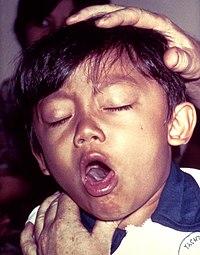
Photo from wikipedia
Background and Objective Gastroesophageal reflux disease (GERD)-associated cough is defined as a special GERD with a predominant cough symptom and is a common cause of chronic cough. This review summarizes… Click to show full abstract
Background and Objective Gastroesophageal reflux disease (GERD)-associated cough is defined as a special GERD with a predominant cough symptom and is a common cause of chronic cough. This review summarizes our current understanding on the pathogenesis and management of GERD-associated cough. Methods Main literatures on the pathogenesis and management of GERD-associated cough were reviewed and our understandings derived from the published studies were showed then. Key Content and Findings Although esophageal-tracheobronchial reflex mainly underlies the pathogenesis of GERD-associated cough, its counterpart-tracheobronchial-esophageal reflex might exist and initiate the cough due to reflux induced by upper respiratory tract infection through the signaling of transient receptor potential vanilloid 1 linking airway and esophagus. The presence of reflux-associated symptoms such as regurgitation and heartburn along with coughing suggests an association between cough and GERD, which is supported by the objective evidence of abnormal reflux as detected by reflux monitoring. Although there is no general consensus, esophageal reflux monitoring provides the main diagnostic criteria for GERD-associated cough. Despite that acid exposure time and symptom associated probability are useful and mostly employed reflux diagnostic criteria, they are imperfect and far from being the gold standard. Acid suppressive therapy has long been recommended as the first choice for GERD-associated cough. However, the overall benefits of proton pump inhibitors have been controversial and need to be further assessed, especially in patients with cough due to non-acid reflux. Neuromodulators have demonstrated potential therapeutic effects for refractory GERD-associated cough, for which anti-reflux surgery may also be a promising treatment option. Conclusions Tracheobronchial-esophageal reflex might initiate reflux-induced cough provoked by the upper respiratory tract infection. It is necessary to optimize the current standards and to explore new criteria with higher diagnostic potency. Acid suppressive therapy is the first choice for GERD-associated cough, followed by neuromodulators and anti-reflux surgery for refractory GERD-associated cough.
Journal Title: Journal of Thoracic Disease
Year Published: 2023
Link to full text (if available)
Share on Social Media: Sign Up to like & get
recommendations!